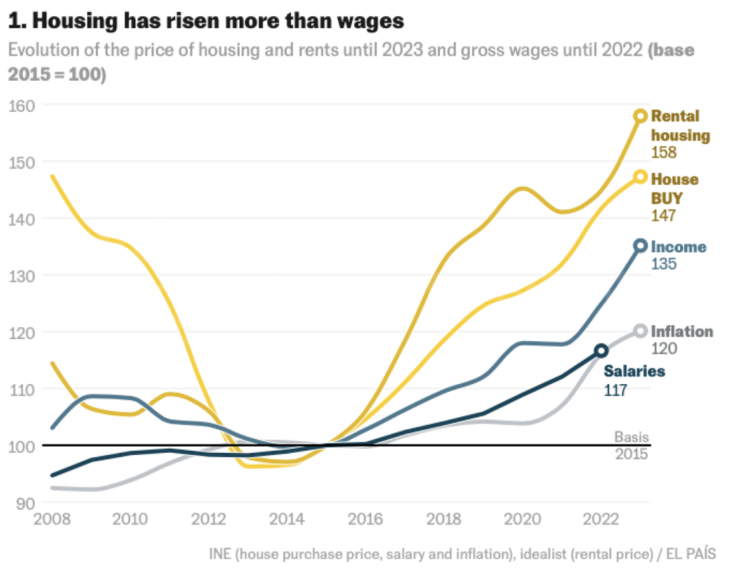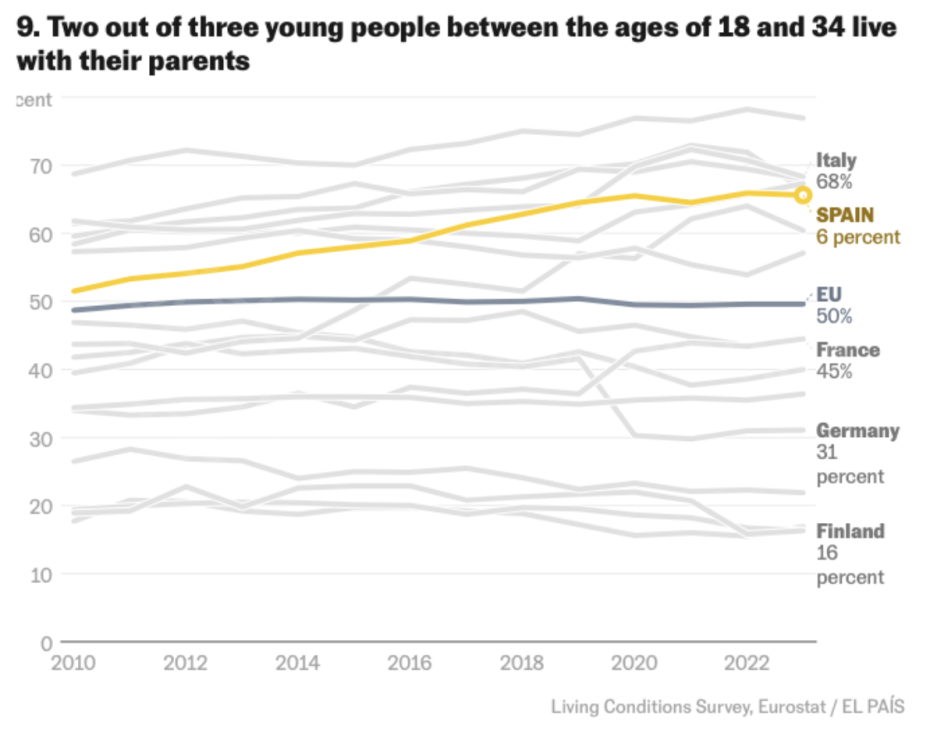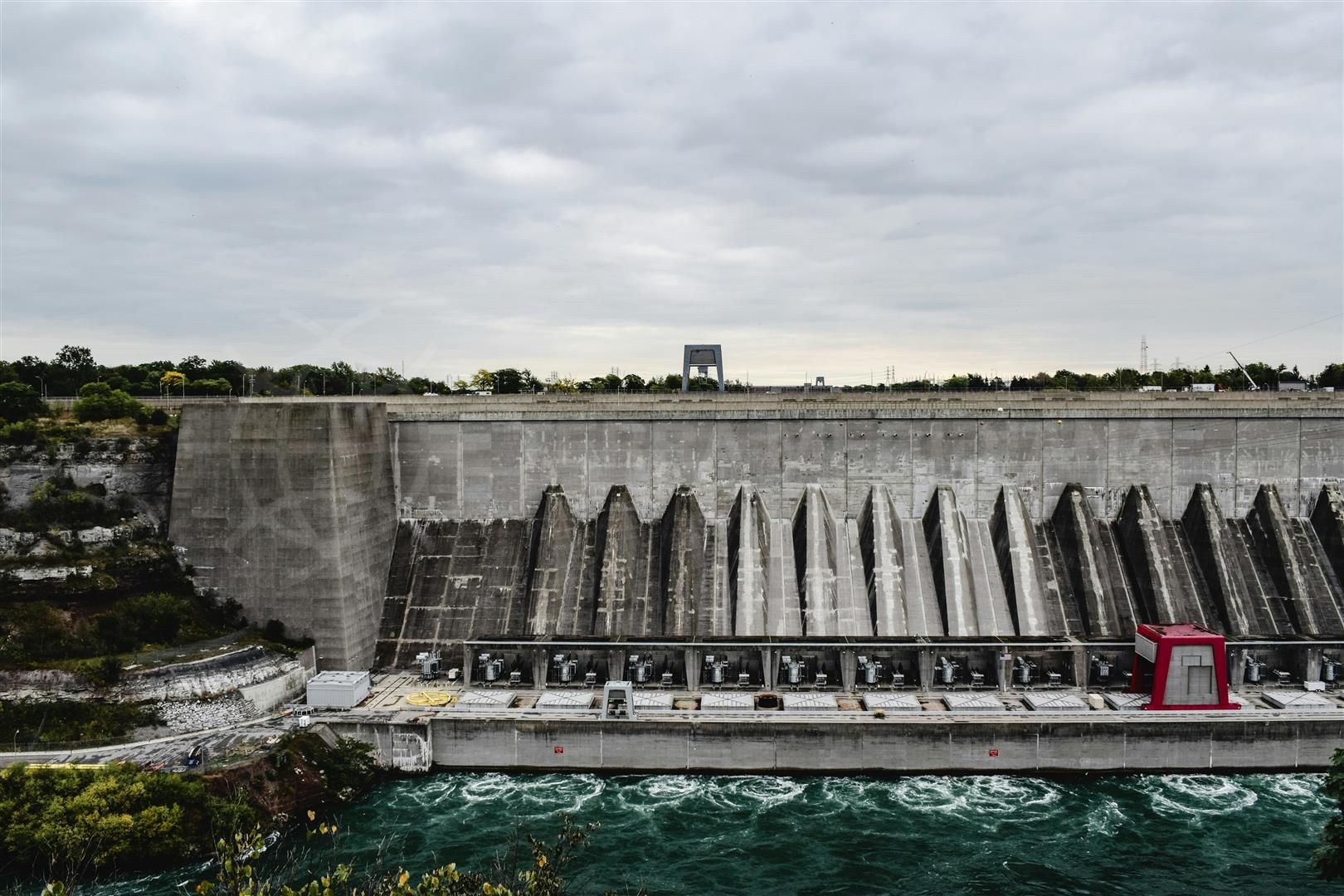Opinion
Is the housing reform dam bursting?
In this article, we delve into the ongoing housing crisis in Spain, fueled by widespread protests over the lack of affordable housing. With mounting public anger and calls for action, the government has been pushed to consider and implement reforms. As we explore the details of these protests, their impact on the housing market, and the solutions being proposed, we take a closer look at the factors contributing to the crisis and the steps being taken to address it. From rising housing costs to the role of tourism and rental practices, the situation in Spain is far-reaching and complex. Let’s examine the underlying issues and proposed changes in the context of Spain’s housing policies.
 Over the last six months there has been several, often quite large, protests across Spain mobilized by anger at the lack of affordable housing. These were often connected with protests against “over-tourism” in certain areas, such as the Balearic and Canary Islands. Pressure from these protests has led to several reforms and proposed reforms. Rather than causing the movement and anger to peter out, it seems to be deepening. What does this mean for housing, home buyers, tenants and landlords?
Over the last six months there has been several, often quite large, protests across Spain mobilized by anger at the lack of affordable housing. These were often connected with protests against “over-tourism” in certain areas, such as the Balearic and Canary Islands. Pressure from these protests has led to several reforms and proposed reforms. Rather than causing the movement and anger to peter out, it seems to be deepening. What does this mean for housing, home buyers, tenants and landlords?
In the month of October there have already been at least three demonstrations for affordable housing. On October 20 there was a demonstration of between 10k-30k in the Canary Islands. The day previously there were between 15k-50k in Valencia (the discrepancy is between police or local government estimates and those of organizers). A large protest looks set to take place on November 9 in Malaga as well.
On October 13, there was a massive protest in Madrid that organizers claimed involved 100,000 people. That would be the largest protest around housing ever, as far as I’m aware. It puts the current movement in the same league as the so-called 15-M movement also known as Los Indignados in 2011, in the depths of the economic crisis.
That movement caused Spain’s two-party political system to fragment at both ends of the political spectrum. It led to the formation of Podemos on the left and Ciudadanos on the right. Thirteen years later, the effects of 15-M still resonate, though Ciudadanos no longer exists and Podemos has split into various groups.
Of course, one can’t predict the future or assume that history repeats itself but it’s obvious that these are not just one-off protests. And it is obvious that they are impacting both the passage of laws and their enforcement.
One way this presents itself is that parties across the political spectrum are suddenly proposing or implementing housing related reforms. Or enforcing pre- existing laws more vigorously.
I’ve written previously on the 2023 Housing Law, a first response to the growing sense of a problem that needed addressing. As I argued at the time, this law largely punished landlords as a substitute for policies that would lead to the construction of more housing.
Since writing that over a year ago, the scale of the problem – and the anger – has become clearer and grown worse. I have returned to writing on this theme multiple times. As a very detailed article in El Pais showed, housing costs have risen much faster than wages or general inflation.

As the article goes on to note, while the number of new households per year in Spain is growing at a rate of 221,000 (2023), the number of new homes being constructed is only around 90,000 per year.
The Underlying Problem
The above fact – the disparity between the number of new homes needed and the number being built – is the fundamental source of the housing crisis in Spain. This gap is the source of all the symptoms that are driving the crisis.
Some of these symptoms include shady operators taking advantage of desperate tenants. That includes real estate agents illegally charging tenants a finder’s fee or landlords making tenants pay six – or more – monthsʼ rent in advance.
There’s also a temptation to only grant short term rental contracts, though a tenant wants a long-term contract because it permits a landlord to raise the rent above the rate set by rent controls.
And, of course, there’s the temptation to take advantage of the tourism bonanza in certain regions to rent out apartments on Airbnb and similar platforms. If you can double your income and have greater control over the upkeep of an investment property, of course you’re going to opt for that.
In some ways, the Airbnb phenomenon is separate from the more general housing crisis. If there were enough houses being built, it wouldn’t eliminate concerns about neighbourhoods being turned into “Disneylands”, but it would remove the element of housing shortages from that debate, at least to a large extent.
There is some connection between the high concentration of Airbnbs and housing costs. However, the housing crisis also exists outside of tourist regions. Across the entire country, housing has become unaffordable. This has led to Spain having one of the highest rates of adult children living at home in the EU – at 66 percent. A third of Spanish households spend more than a third of their income on housing.

The Proposed Solutions
The scale of the crisis is now so unavoidable, as both an economic and a political phenomenon, that politicians can no longer avoid doing something.
The most talked about reforms have related to restricting Airbnb licenses in various cities. For many people, the heavy population of tourists during high season are the most obvious, visible symbol of the housing problem.
But there are other reforms either happening already or being prepared.
On October 21, El Pais also reported on a crackdown by Consumer Affairs against illegal activities such as real estate agents charging finder’s fees or making prospective tenants pay several monthsʼ rent. No details on the number of investigations are given and one suspects that the Spanish government is releasing this news to say “see, we’re doing something!” If it was a widespread crackdown having a real impact, they would tout the numbers.
There are also several reforms that the Spanish government has attempted – unsuccessfully – to pass this fall, related to Airbnb style housing. With the momentum of the anger and protests continuing, it now appears they will be able to pass a series of regulatory reforms. No one wants to stand in the way of housing reform given the current mood.
There are several elements to this reform, but it can basically be boiled down to a couple of key features. First is creating a national registry for housing offered on digital sites for tourist, seasonal or short-term rentals. They will be assigned a registry number if they are accepted, based upon the regulations in their autonomous community.
This is actually in line with an already-passed EU law but the Spanish government is now speeding up its implementation to early 2025 instead of 2026, as the law dictates.
The second part of the law revolves around compliance.
Property portals, whether that be Airbnb, Booking, or Idealista and Fotocasa, will be required to ensure that their listings for such rentals have and display their identification number.
At the national level, landlords must provide a justification for a short term or seasonal contract vs a long-term contract, which grants tenants more rights. This is meant to prevent fraudulently acquired, and thus illegal, rent hikes.
There will be pushback and public posturing by the different parties, as they seek to jockey for support amongst their bases of support. But there’s also a raft of new regulations in PP controlled cities, like Malaga, and at the Andalusia regional level. Everyone is trying to get ahead of this.
It’s not a terrible thing for the rental market to have some order brought to it. It’s not terrible for there to be proper licensing and registration of Airbnbs. Certainly, regular hotels must be licensed – as does every other business in the country. I’ve also written on the need for regulation in the real estate industry.
But the concern is that regulation and clampdowns (or announcements of clampdowns anyway) are not a substitute for action that moves the needle on the housing crisis. And at the risk of sounding like a broken record – the only way to resolve the housing crisis is to build more houses, enough to cover the formation of new households.
I don’t think we want to live in a society that tries to solve social and political problems through repressive legal measures. Of course, laws and regulations are necessary, but we need to also focus on dealing with the underlying problems, not just their symptoms.
Levying fines on landlords may reduce the number who try to use the housing shortage to price gouge. It may reduce the number of real estate agents charging a finder’s fee. But fines don’t build housing.
By Adam Neale | Opinion | November 27th, 2024
